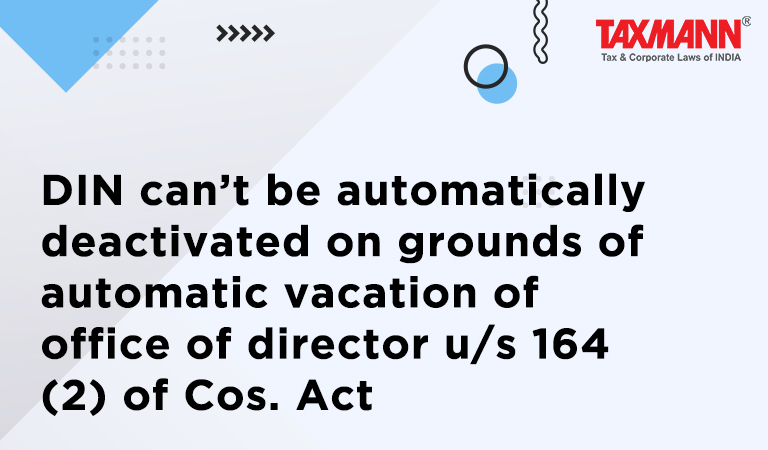DIN can’t be automatically deactivated on grounds of automatic vacation of office of director u/s 164 (2) of Cos. Act
- News|Blog|Company Law|
- 2 Min Read
- By Taxmann
- |
- Last Updated on 1 March, 2022

Case Details: Satya Narayan Banik v. Union of India 135 taxmann.com 352 (Calcutta)[11-02-2022]
Judiciary and Counsel Details
-
- Rajasekhar Mantha, J.
- Rajarshi Dutta, Sayantan Bose, Rahul Podder, Ms. A. Banerjee, Mrs. Anyapurba, Avinash Kankani and Siddhartha Lahiri for the Petitioner.
Facts of the Case
In the instant case, petitioners were aggrieved by cessation of office as directors of M/s. Hahnemann International Pvt. Ltd. The disqualification happened by operation of Section 164 (2) for not filing balance sheets and annual returns for a continuous period of three years from the year 2014-15. The ROC also deactivated the Director Identification Number (DIN) of the petitioner-directors.
The petitioners advanced a three-fold argument challenging such disqualification:
(a) That they were not permitted to avail the benefit of the “Company’s Fresh Start Scheme of 2020” despite applying by letter dated 11th November 2020.
(b) That the petitioners were not afforded a prior hearing before the disqualification as a director and were hence denied principles of Natural Justice.
(c) The Registrar of Companies is not authorized to deactivate their Director Identification Numbers (DIN) and such activation of DIN according to the disqualification is not automatic.
The Hon’ble Court viewed that the failure to file balance sheet and the annual returns for three consecutive years amounts to deliberate and willful negligence. A director is a responsible officer of the company and is expected to act with diligence and urgency. The directors could not take the plea that some other person was entrusted to file the financials of the Company. So, there was no scope of condonation or curing the omission.
High Court Held
The Court held that since the disqualification under Section 164 (2) and 167 (1)(a) was automatic, by the operation of law and leaving no discretion on the authorities, the question of application of the principle of natural justice particularly prior hearing does not and cannot arise. The Rules of Natural Justice be read into the process of application and operation of Section 164 (2) and 167 (1) of the said Act.
Relying on the case Yashodhara Shroff v. Union of India [2019] 106 taxmann.com 297 (Karnataka), the Court held that DIN cannot be cancelled on account of a disqualification sustained under section 164(2). The cancellation or surrender or deactivation of DIN is stipulated in Rule 11 of the Companies (Appointment and Qualification of Directors) Rules, 2014. Rule 11 does not permit cancellation of or deactivation of DIN on account of disqualification of a director under Section 164(2) of the Act at all but at the same time, the company must comply with the filing Form DIR-9.
Disclaimer: The content/information published on the website is only for general information of the user and shall not be construed as legal advice. While the Taxmann has exercised reasonable efforts to ensure the veracity of information/content published, Taxmann shall be under no liability in any manner whatsoever for incorrect information, if any.

Taxmann Publications has a dedicated in-house Research & Editorial Team. This team consists of a team of Chartered Accountants, Company Secretaries, and Lawyers. This team works under the guidance and supervision of editor-in-chief Mr Rakesh Bhargava.
The Research and Editorial Team is responsible for developing reliable and accurate content for the readers. The team follows the six-sigma approach to achieve the benchmark of zero error in its publications and research platforms. The team ensures that the following publication guidelines are thoroughly followed while developing the content:
- The statutory material is obtained only from the authorized and reliable sources
- All the latest developments in the judicial and legislative fields are covered
- Prepare the analytical write-ups on current, controversial, and important issues to help the readers to understand the concept and its implications
- Every content published by Taxmann is complete, accurate and lucid
- All evidence-based statements are supported with proper reference to Section, Circular No., Notification No. or citations
- The golden rules of grammar, style and consistency are thoroughly followed
- Font and size that’s easy to read and remain consistent across all imprint and digital publications are applied



 CA | CS | CMA
CA | CS | CMA
